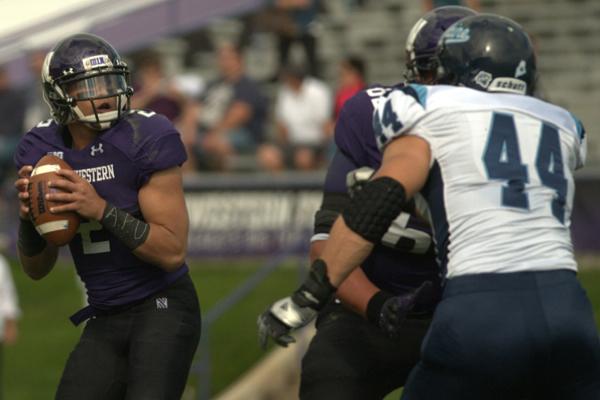What the NLRB’s union decision means for Northwestern, NCAA

Former Northwestern quarterback Kain Colter led the ultimately unsuccessful effort to unionize the NU football team.
August 17, 2015
The National Labor Relations Board on Monday declined jurisdiction in the Northwestern union case, effectively (if not officially) reversing the Chicago regional director’s ruling that the players are University employees.
Monday’s ruling marks the end of the union saga at NU but not necessarily the end of unionization as a potential vehicle for NCAA reform.
Here’s what it means for the involved parties:
For Northwestern:
The College Athletes Players Association can’t appeal this decision. The NLRB’s ruling is final.
That means we’ll never see the results of the union election the Wildcats’ players had in April. Most reports suggested the players voted against unionizing, but no one will ever know for sure.
We’ll also never know what the program would have looked like in the form of a union. This must be a relief for coach Pat Fitzgerald, who openly opposed the union throughout the process.
CAPA sought the ability to negotiate for reforms such as a trust fund for graduated players and improved medical coverage in case of injury. Under a legally recognized union, conditions could be collectively bargained and therefore binding in a way any current policy changes are not. So while NU will continue offering four-year guaranteed scholarships, nothing, legally speaking, could stop them from changing their mind and stopping that practice.
For now, NU will continue under the existing power structure, without a union representing the players’ rights.
For other private schools with Division I football programs:
Administrators from South Bend to Palo Alto just breathed a sigh of relief. This ruling avoids the precedent that college athletes are employees and prevents players at other schools from following similar courses of action.
That said, the NLRB left open the possibility of considering similar cases in the future. The board did not explicitly rule that the NU players were not employees but rather declined jurisdiction.
In fact, United Steelworkers political director Tim Waters, who backed the NU union from the start, told The Daily on Monday that athletes at other schools have expressed interest in organizing.
For the NCAA:
A pro-players ruling from the NLRB could have been the beginning of the end for the NCAA’s system of amateurism. Instead, the college sports governing body can forget about unions for the moment and focus on other incoming threats.
Advocates like Ramogi Huma, who teamed with former NU quarterback Kain Colter to spearhead the union effort, will probably move on to the next tactic in their crusade against the NCAA.
Though unionization could be a strong vehicle for college athletes’ rights advocacy, there are other ways these goals might be accomplished. Anti-trust lawsuits such as the ones filed Ed O’Bannon and Jeffrey Kessler could undercut the NCAA in similar ways and result in a reformed system with the same spirit as the unionization movement if perhaps a different form.
Change to the college sports status quo seems inevitable. But after today, unionization is less likely to be the mechanism that will affect it.
Email: asputt@u.northwestern.edu
Twitter: @AlexPutterman


